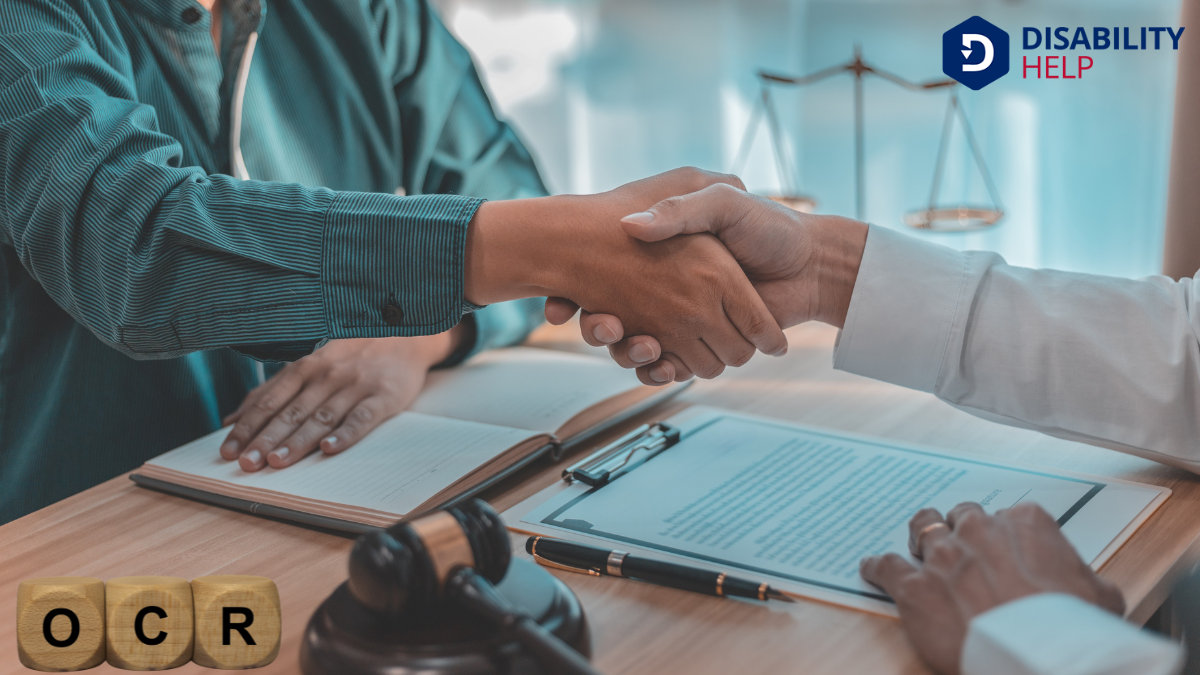Let's explore the vital role the Office for Civil RightsThe rights of individuals to receive equal treatment under the law, including protection against dis... (OCR) plays in disability cases. As advocates for fairness, we guarantee that individuals with disabilities aren't subjected to discrimination. These efforts are essential in educational institutions, public services, and workplaces. By enforcing federal laws like the ADA and Section 504A provision of the Rehabilitation Act of 1973 that prohibits discrimination based on disability in p..., we pave the way for equal opportunities. But how exactly does the OCR accomplish this mission? There's much more to uncover.
Key Takeaways
- The Office for Civil Rights enforces federal disability rightsThe legal and human rights afforded to individuals with disabilities, often the focus of advocacy an... laws like the ADA and Section 504.
- It investigates complaints of disability discriminationUnfair treatment of individuals based on their disability in areas such as employment, education, an... in educational institutions and public services.
- The OCR monitors compliance by conducting assessments and providing guidance to organizations.
- It resolves discrimination issues through mediation or enforcement actions.
- The OCR provides technical assistance and training to help institutions comply with disability laws.
Overview of the Office for Civil Rights
The Office for Civil Rights (OCR) plays an essential role in ensuring compliance with federal civil rights laws, particularly when it comes to protecting individuals with disabilities.
We recognize that maneuvering through these laws can be intimidating, so let’s break it down together. OCR, a division of the U.S. Department of Education, is dedicated to eliminating discrimination and ensuring equal accessThe principle that all individuals, including those with disabilities, should have equal opportunity... to education for everyone, including those with disabilities.
They enforce laws like the Americans with Disabilities Act (ADA)A U.S. law that prohibits discrimination against individuals with disabilities in all areas of publi... and Section 504 of the RehabilitationThe process of helping individuals with disabilities achieve and maintain their optimal physical, se... Act. Our shared goal is to foster environments where individuals with disabilities can thrive without barriers.
Key Responsibilities of the OCR

As we explore the key responsibilities of the Office for Civil Rights, we'll focus on two essential areas: enforcing disability rights and investigating discrimination complaints.
Together, these tasks guarantee that individuals with disabilities receive fair treatment and equal access to opportunities.
Let's consider how the OCR's efforts in these areas impact our communities.
Enforcing Disability Rights
While guaranteeing equal access and opportunity for individuals with disabilities, the Office for Civil Rights (OCR) takes on a pivotal role in enforcing disability rights across various sectors.
We focus on implementing key federal laws like the Americans with Disabilities Act and Section 504 of the Rehabilitation Act. By doing so, we aim to prevent discrimination and guarantee inclusivity in educational institutions, healthcare facilities, and public services.
We actively monitor compliance through regular assessments and guidance to organizations, helping them understand their obligations. By providing technical assistance and training, we empower institutions to foster accessible environments.
Our commitment to enforcing these laws guarantees that every individual with a disability is treated with dignity and respect, promoting a society where equality prevails.
Investigating Discrimination Complaints
When individuals believe they've faced discrimination due to their disability, they can turn to us at the Office for Civil Rights for help. Our role is to thoroughly investigate these complaints, ensuring fairness and justice.
We follow a detailed process to understand and address the issues at hand.
- Complaint Assessment: We start by reviewing the complaint to determine if it falls under our jurisdiction.
- Gathering Information: Next, we collect relevant documents and interview involved parties to get a clear picture.
- Analysis: We analyze the gathered data to identify any violations of disability rights.
- Resolution: Finally, we work toward resolving the issue, which may include mediation or enforcement actions.
Our commitment is to uphold the rights of individuals with disabilities, ensuring discrimination is addressed and rectified.
Understanding Disability Rights Legislation
As we explore disability rights legislation, it’s crucial to understand the key laws like the Americans with Disabilities Act (ADA) and Section 504 of the Rehabilitation Act.
These laws set out compliance requirements and protections to guarantee individuals with disabilities have equal access and opportunities.
Key Disability Rights Laws
Understanding disability rights legislation is vital for guaranteeing equal opportunities for all individuals. Key disability rights laws lay the foundation for protecting those with disabilities, guaranteeing they can access the same opportunities as everyone else.
Let's explore some of these significant laws together:
- Americans with Disabilities Act (ADA): This landmark law prohibits discrimination and guarantees equal opportunities in public life.
- Rehabilitation Act of 1973A U.S. law that prohibits discrimination based on disability in federal programs and services, inclu...: Section 504 prevents discrimination in programs receiving federal financial assistance.
- Individuals with Disabilities Education Act (IDEA): This guarantees students with disabilities have access to free, appropriate public education.
- Fair Housing Act: This law protects against discrimination in housing-related activities.
ADA Compliance Requirements
Building on the foundation of key disability rights laws, we now turn our attention to the specific compliance requirements under the Americans with Disabilities Act (ADA). The ADA guarantees that individuals with disabilities have equal access to public spaces, employment, and services.
We must focus on three main areas:
- Title I addresses employment, requiring employers to provide reasonable accommodationsModifications or adjustments in healthcare settings to support patients with disabilities. unless it causes undue hardshipA legal concept that refers to significant difficulty or expense imposed on an employer or service p....
- Title II covers public entities, mandating accessibilityThe design of products, devices, services, or environments to be usable by people with disabilities.... in programs and services.
- Title III focuses on public accommodations, guaranteeing facilities like restaurants and hotels are accessible.
Compliance involves removing barriers, both physical and procedural, and implementing policies that promote inclusionThe practice of creating environments in which any individual or group can be and feel welcomed, res.... By adhering to these standards, we support a more inclusive society where everyone can participate equally.
Section 504 Protections
Although the Americans with Disabilities Act (ADA) is often highlighted, Section 504 of the Rehabilitation Act of 1973 laid the groundwork for disability rights legislation in the United States.
It guarantees that individuals with disabilities aren’t excluded from programs or activities receiving federal financial assistance. Understanding Section 504 helps us appreciate the protection it offers and its impact on our daily lives.
- Equal Access: Public schools and universities must accommodate students with disabilities, guaranteeing equal access to education.
- Non-Discrimination: Employers receiving federal funds can’t discriminate based on disability, promoting fair employment practices.
- Program Access: Public transportation must be accessible to all, eliminating barriers for those with disabilities.
- Health Services: Federally funded health programs must provide equal services, guaranteeing no one is left behind.
Investigating Disability Discrimination Complaints
When we explore the process of investigating disability discrimination complaints, it becomes clear that the Office for Civil Rights (OCR) plays an essential role in ensuring fair treatment for all individuals.
At the heart of this process, OCR receives complaints from those who feel they’ve faced discrimination due to a disability. We assess each complaint to determine if it falls within our jurisdiction under federal civil rights laws.
Once accepted, we conduct a thorough investigation, gathering evidence and interviewing relevant parties. Our objective is to uncover whether any discriminatory practices have occurred.
If we find violations, we work towards a resolution, seeking voluntary compliance or taking enforcement actions. By doing so, we help uphold the rights of individuals with disabilities.
Providing Technical Assistance and Guidance

Beyond investigating complaints, our role at the Office for Civil Rights extends to offering technical assistance and guidance.
We recognize the importance of equipping institutions and individuals with the knowledge to navigate disability-related challenges. Our guidance helps guarantee that everyone understands their rights and responsibilities under the law.
Here’s how we provide support:
- Workshops and Training Sessions: We organize sessions to educate on disability rights and best practices.
- Resource Materials: We distribute brochures, fact sheets, and online resources tailored to specific needs.
- Expert Consultations: We offer one-on-one consultations to address unique questions or concerns.
- Policy Development Support: We assist in creating policies that align with federal standards.
Ensuring Compliance With Federal Laws
To guarantee compliance with federal laws, we actively monitor and assess institutions to uphold the rights of individuals with disabilities. Our role involves conducting thorough reviews and investigations to ascertain that these entities adhere to mandates such as the Individuals with Disabilities Education Act (IDEA) and Title II of the Americans with Disabilities Act (ADA).
We’re committed to identifying issues and addressing them promptly to foster an inclusive environment.
When we identify areas of non-compliance, we work with institutions to develop corrective action plans. Our goal isn't just to enforce regulations but to educate and guide institutions toward sustainable practices.
The Impact of the ADA and Section 504
Although the Individuals with Disabilities Education Act (IDEA) plays an essential role, it’s the Americans with Disabilities Act (ADA) and Section 504 of the Rehabilitation Act that profoundly shape our society's accessibility standards.
These laws guarantee that individuals with disabilities have equal opportunities and access to public spaces and services. They’ve transformed our communities by setting a benchmark for inclusion and equality.
The impact is tangible in many ways:
- Public Buildings: Ramps and elevators are now standard features for accessibility.
- Employment: Employers must provide reasonable accommodations to support employees with disabilities.
- Transportation: Public transit systems are required to be accessible to all passengers.
- Communication: Telecommunications are adapted for individuals with hearing and speech impairments.
Together, the ADA and Section 504 empower us to create a more inclusive society.
Protecting Disability Rights in Education

As we explore protecting disability rights in education, let's focus on guaranteeing equal access for all students, addressing any allegations of discrimination, and monitoring compliance efforts.
Together, we can create an environment where every student has the opportunity to succeed without facing barriers due to their disabilities.
It's essential that we remain vigilant and proactive in enforcing these rights to secure fairness and inclusivity in educational settings.
Ensuring Equal Access
When we consider the importance of education, we realize that guaranteeing equal access for students with disabilities is essential.
It’s not just about compliance; it’s about fostering an inclusive environment where every student can thrive. The Office for Civil Rights (OCR) plays a significant role in this mission.
By enforcing laws like Section 504 of the Rehabilitation Act and the Americans with Disabilities Act, they guarantee that schools provide necessary accommodations. This includes:
- Accessible facilities: Guaranteeing ramps, elevators, and other modifications are in place.
- Specialized instructional support: Providing tailored educational plans to meet individual needs.
- Assistive technology: Offering tools like text-to-speech software to aid learning.
- Training for educators: Equipping teachers with strategies to support diverse learners.
Together, we can make education a truly accessible space for all.
Addressing Discrimination Allegations
Addressing allegations of discrimination is essential in upholding disability rights in education. When we encounter such claims, it's vital to act promptly and thoroughly.
The Office for Civil Rights (OCR) plays a pivotal role by investigating complaints and guaranteeing schools comply with federal laws like Section 504 of the Rehabilitation Act and the Americans with Disabilities Act (ADA).
We must remember that each case is unique, requiring careful examination of all relevant facts. Our responsibility includes gathering evidence, interviewing involved parties, and making informed decisions.
We aim to guarantee that educational institutions provide fair treatment to students with disabilities. By addressing these allegations effectively, we not only protect individual rights but also promote an inclusive and equitable learning environment for everyone.
Monitoring Compliance Efforts
To guarantee educational institutions adhere to federal disability laws, we actively monitor compliance efforts. Our goal is to confirm that all students with disabilities receive the support and accommodations they deserve.
We employ various strategies to track and evaluate how schools implement these laws. By maintaining a vigilant presence, we can address potential issues before they escalate.
- Site Visits: We periodically visit schools to observe how they implement accommodations and modifications.
- Data Analysis: We scrutinize reports and data submitted by educational institutions to assess compliance.
- Guidance and Training: We offer resources and training for educators to better understand their responsibilities.
- Feedback Channels: We establish open channels for students and families to report concerns or non-compliance.
Through these efforts, we aim to uphold and protect disability rights in education.
Addressing Disability Discrimination in Healthcare
Maneuvering the complexities of healthcare can be intimidating for anyone, but individuals with disabilities often face additional hurdles due to discrimination.
It’s essential we comprehend how the Office for Civil Rights (OCR) plays a pivotal role in addressing these challenges. The OCR guarantees that healthcare providers comply with federal laws like the Americans with Disabilities Act (ADA) and Section 504 of the Rehabilitation Act.
These laws mandate that individuals with disabilities receive equal access to medical services. When discrimination occurs, the OCR investigates complaints and works to resolve issues through settlement or enforcement actions.
Promoting Equal Employment Opportunities for Individuals With Disabilities
While guaranteeing equitable access to healthcare is essential, fostering equal employment opportunities for individuals with disabilities is equally important.
We must make certain workplaces are accessible and inclusive, allowing everyone to contribute their abilities and talents. The Office for Civil Rights plays an essential role in this by enforcing anti-discrimination laws and promoting best practices.
By understanding our rights and obligations, we can build a more inclusive workforce.
Key strategies include:
- Accessible Workspaces: Guaranteeing physical environments accommodate all employees.
- Reasonable Accommodations: Providing necessary adjustments for individuals to perform their job effectively.
- Anti-Discrimination Training: Educating employees on disability rights and fostering understanding.
- Inclusive Hiring Practices: Actively seeking diverse candidates and eliminating biases in recruitment.
Together, we can create workplaces where everyone thrives.
Frequently Asked Questions
How Can Individuals File a Complaint With the Office for Civil Rights?
To file a complaint with the Office for Civil Rights, we can complete their online form or mail a letter detailing the issue. Let's guarantee we include all relevant information, like contact details and any supporting documentation, for a thorough review.
What Is the Timeline for Resolving a Disability Discrimination Complaint?
We typically see a resolution within 180 days of filing a disability discrimination complaint. Let's guarantee all necessary information is included in our submission to help speed up the process and achieve a fair outcome.
Does the Office for Civil Rights Provide Legal Representation?
We don't provide direct legal representationThe way people with disabilities are depicted in media, culture, and politics, often influencing pub.... However, we investigate complaints and guarantee compliance with civil rights laws. If you need legal representation, consider consulting a lawyer or legal aid service to support your case.
How Does the OCR Collaborate With Other Government Agencies?
We collaborate with other government agencies by sharing information, coordinating investigations, and developing policies. This teamwork guarantees thorough protection of rights and streamlines processes. Together, we enhance our ability to address violations and support individuals effectively.
Are There Any Recent Updates to Disability Rights Laws?
We’ve seen recent updates to disability rights laws that enhance protections and improve accessibility. Let’s explore how these changes impact us and guarantee we’re equipped to advocate and comply with the latest legal standards for inclusivity.
Conclusion
In conclusion, we've seen how the Office for Civil Rights is pivotal in ensuring that individuals with disabilities aren't discriminated against. By enforcing laws like the ADA and Section 504, we help create a more inclusive society. Our role involves investigating complaints, providing guidance, and promoting awareness across sectors such as education, healthcare, and employment. Together, let's continue to champion equal access and opportunities for all individuals, so everyone can thrive without barriers.






